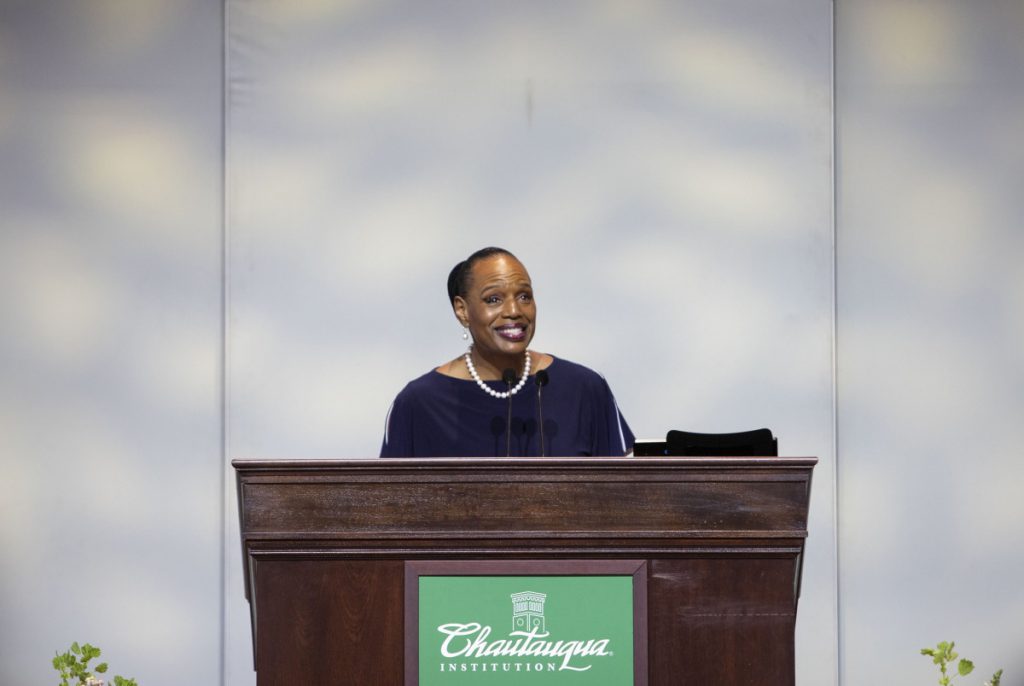The discussion on civil and human rights in the United States requires a truthful conversation between two receptive, open-minded parties, as if they were old friends.
Congressional Black Caucus Foundation President and CEO Nicole Austin-Hillery approached Chautauquans with that exact mindset, calling on them to engage in a dialogue on race based in truth and respect.
“I truly believe that the only way we can resolve the issues that we are facing, not only in this country, but across the world right now, when it comes to the fight for civil and human rights, is to start from a point of truth-telling,” Austin-Hillery said.
Austin-Hillery took the lectern at 10:45 a.m. Tuesday, July 12, in the Amphitheater to closely examine how civil and human rights are inherently the same, and how the United States can move toward progress in achieving equality and civil liberties for all.
Continuing on Week Three’s theme of “The Future of Human Rights,” Austin-Hillery was the second Chautauqua Lecture Series speaker to talk about civil liberties in U.S. systems in her lecture, following Alison Brysk, Mellichamp Chair of Global Governance at University of California, Santa Barbara, on Monday.
A graduate of the Howard University School of Law and Carnegie Mellon University, Austin-Hillery was the first to serve as the executive director of the U.S. Program of Human Rights Watch, a non-governmental organization that studies and advocates for human rights. Austin-Hillery was appointed president and CEO of the Congressional Black Caucus Foundation in February 2022.

To open her speech, Austin-Hillery told Chautauqua she would be speaking the truth from her vantage point of being an advocate for civil and human rights in her career, and asked the audience to voice their truths in the Q-and-A session, as well.
The conversation launched from Austin-Hillery’s four declarations of truth that she has made to navigate discourse about civil and human rights. The first of her declarations was that civil rights and human rights are inextricably linked.
She read the United Nations’ definition of human rights, which says: “Human rights are rights inherent to all human beings, regardless of race, sex, nationality, ethnicity, language, religion or any other status. Human rights include the right to life and liberty, freedom from slavery and torture, freedom of opinion and expression, the right to work and education, and many more.”
Then Austin-Hillery recited Merriam-Webster’s definition of civil rights, which reads: “The rights of personal liberty guaranteed to U.S. citizens by the 13th and 14th Amendments to the Constitution and by acts of Congress.”
Having delivered the definitions, Austin-Hillery pointed out a glaring truth: that the meanings are inherently the same.
“Both human and civil rights protect a human being against injustice, mistreatment and oppression, simply put,” Austin-Hillery said. “It’s based on the understanding that we have to accept and acknowledge that the two are inextricably linked and that … without accepting (the first) declaration, we cannot begin to address the problem of racial injustice in the United States. … We need one to make the other work, and we need them both to get us to the next level, to make us better.”
In accepting Austin-Hillery’s first declaration, she said people can understand her second declaration, which is that “the fabric of this country, the systems upon which it was built, and that we adhere to, have race at their foundation.”
“We have to also understand that in the history of the United States, the people who have been prevented from exercising and fully availing themselves of these rights, whether civil or human, have mostly been people of color,” Austin-Hillery said. “I don’t care what anyone says, if we look at the history of this country and the systems that have been created and the systems that have oppressed and have caused discrimination, the people who have been most impacted by that and by those systems are people of color.”
Austin-Hillery presented this statement with evidence, citing her past working in law in Washington.
The three examples she gave to support her second declaration were slavery, unequal opportunities for education and the history of the police system in the United States. Austin-Hillery drew on an article from The New Yorker, titled “The Invention of the Police,” by Jill Lepore, that explored how the police derived from Barbados slave patrols dating back to the 1600s.
“The use (of slavery) was all about controlling these new people who were brought from Africa to serve, to till land, to till soil, to be at the beck and call of their owners,” Austin-Hillery said. “And these slave patrols are the earliest iterations of what we now call our police organizations in the United States.”
Moving on from the past to examine the present state of civil rights in the United States, her third declaration is that the United States is in a period of rights retrenchment. Austin-Hillery said the United States has come a long way in the past 60 years in terms of civil rights, but as of this moment, America is seeing a reckoning in human rights.
“We are witnessing something wholly different,” Austin-Hillery said. “We are witnessing an effort to roll back these successes and these victories, these efforts that were put in place to expand, protect and defend hard won rights.”
She said the infringements of rights, especially for people of color, include the recent reversal of Roe v. Wade, strict voter identification laws and the police brutality that is responsible for taking the lives of Black people across the country, including George Floyd, Eric Garner, Tamir Rice, Jalen Walker and many more African Americans who deserve to be named and honored.
The pandemic, Austin-Hillery said, opened the eyes of many to these retrenchments that directly affect Black communities, and she was approached with a simple statement by many: “Nicole, I didn’t know.”
“They said, ‘I didn’t know,’ ” Austin-Hillery said. “Well, guess what? Now you know.”
This response led Austin-Hillery to give her fourth and final declaration, which says that we combat the retrenchment through the use of civil and human rights approaches as tools for change.
“We no longer have the luxury of saying this issue of civil rights and human rights is for somebody else. It’s for someone else to deal with. It’s someone else’s problem,” Austin-Hillery said. “It is our problem. And we all have to take it on as a part of our individual responsibilities to figure out what in the heck we do about it.”
Austin-Hillery commended leaders in civil rights like Martin Luther King Jr., Malcolm X, Eric Holder and John Lewis and their efforts in combating the stifling of civil liberties.
She promoted a four-point agenda the Office of the High Commissioner of the United Nations made to advise people on how to tackle civil and human rights. Point one says to stop denying and start dismantling; point two says to end impunity and start to build trust; point three says to simply listen; point four says we must redress and confront past legacies to deliver reparatory justice.
To conclude her speech, Austin-Hillery circled back to the beginning, with the idea that truth enables real progress and real conversation.
“When we look in the mirror, we have to ask ourselves the question, if we are living in this nation that is suffering from the cancer of (racism), what are we doing about it?” Austin-Hillery said. “And if you are not figuring out something in your corner of the world that you can do about it, if you are not engineering how we do better, how we can be better, how we can treat one another better, how we can ensure people’s lives are better, then maybe if we’re not doing that, maybe we’re all parasites on society if we don’t rise to that challenge.”
Austin-Hillery advised Chautauquans to remember and acknowledge her four declarations in understanding race in the United States, and she asked them to reflect on their position in the universal struggle for equality.
“The question that you have to ask yourself is: ‘If not now, when? If not me, then whom?’ ” Austin-Hillery said. “We only need to follow our instincts, our hearts, and our souls, and these lessons from history to know how we have to proceed and how we have to move forward. That is what democracy looks like. That is what America is supposed to look like. And that is how we will create a union of what I like to call social justice warriors and change makers. That’s who you are. That’s what I believe you have in you.”





